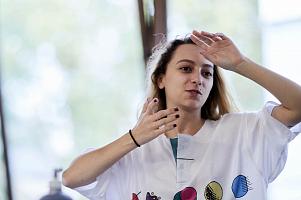BA (Hons)
Social Work
Content navigation menu
Why study BA Social Work at Goldsmiths
Drawing on current research, government guidance and legislative frameworks, this degree focuses on the issues that are key in facilitating your development as a social worker.
- Both an academic and professional qualification, so it's ideal if you're interested in pursuing a professional career in social work.
- We'll equip you with the knowledge, values and skills you'll need to practise as a reflective and ethical social worker, equipped for the challenges of contemporary social work practice.
- Our social work programmes are highly regarded by potential employers within London and further afield, and our graduates have an excellent record of securing employment.
- The degree includes practice placements in two settings and with different service user groups, so you'll be able to gain invaluable real-world experience.
- You will cover topics including: social work practice methods; anti-oppressive practice; social theories; developmental perspectives; research methodologies; and social policy. The knowledge that you gain will help you develop the broad set of skills and perspectives needed for successful social work practice in a variety of settings.
- We'll encourage you to think deeply about human rights and social justice, and to embed these values in your practice.
- Social work education at Goldsmiths has a long and distinguished record – you'll be taught by established social work academics and associate lecturers who have considerable research and/or practice experience in their fields.
- The degree also prepares you according to the Professional Capabilities Framework (PCF), the Quality Assurance Agency subject benchmark for social work, and the Department of Health's requirements for social work training.
- You will study with a cohort of other social work students from London and elsewhere, and some of your modules will also allow you will also study alongside students from other programmes, including Youth Work and Community Studies. Interdisciplinarity is a strength of our programme.
Contact the department
If you have specific questions about the degree, contact the programme convenor, Siddhesh Mukerji.
UCAS code
L500
Entry requirements
A-level: CCC
BTEC: DDM
IB: 27 points overall with three HL subjects at 555
Length
3 years full-time
Fees
Home - full-time: £9250
International - full-time: £19640
Department
Social, Therapeutic and Community Studies

Students who successfully complete the degree will have met the standards set out by Social Work England (SWE) and will be eligible to apply to SWE for registration as a social worker.
NB- This programme is in the process of being re-validated by Social Work England.
Overview
Structured learning
The degree aims to provide you with the value, knowledge and skill base for social work practice, and is organised around study units, workshops, lectures/seminar courses, projects and private study.
The teaching and learning opportunities centre on the key areas of the social sciences and their application to social work practice, as well developing your intellectual capacity, and the skills necessary to get you ready for practice. There is an expectation that you attend at least 85% of all aspects of the programme.
The structured learning includes specific learning in:
- Human growth and development, mental health and disability
- Social work theories and methods; assessment, planning, intervention and review
- Communication skills with children, adults and those with particular communication needs
- Law, and partnership working across professional disciplines and agencies
- Social science research methods, including ethical issues
Learning through practice
Practice is central to the degree, and there will be practice placements in two settings and with different service user groups (eg child care and mental health). The learning on the programme builds over the three years and prepares you to apply your knowledge to practice situations.
We work closely with a range of practice organisations in the Greater London Area. The placements are allocated by our placement tutor and matched with individual profiles. You will be expected to work the core hours of the placement agency.
You undertake a number of assessed practice placements. You are required to spend 170 days in practice settings. We have partnership agreements with many London boroughs and with about 20-30 voluntary/private social care agencies each year.
You will be expected to work the normal working hours of the agency so should be available between the core hours of 8.30am and 6pm, although occasionally you may be required to work evenings. Depending on where you live in London, you may need to travel up to two hours to your practice placement. If you live outside of London, your travel time may be considerably longer.
What you'll study
In your first year of study, you are introduced to social work as a professional activity and an academic discipline. You consider key concepts such as the nature of need, community, social work services, and the significance of the service user perspective. Major theoretical approaches within the social sciences and their relationship to social work will be investigated, as will studies in professional development for practice, where you will have the opportunity to shadow a qualified social worker.
You will study the following modules:
| Module title | Credits |
|---|---|
| Introduction to Social Work, Community Development, and Youth Work | 15 credits |
| Group Work | 15 credits |
| Introduction to Applied Social Science Research | 15 credits |
| Professional Development for Practice | 30 credits |
| Foundation to Social Work | 15 credits |
| Introduction to Social Science | 15 credits |
| Race, Racism and Professional Practice | 15 credits |
Practice placements
You are required to spend 170 days in practice settings. These placements are arranged through the allocation system devised by the College.
Teaching style
The learning on the programme builds over the three years and prepares you to apply your knowledge to practice situations. The teaching includes lectures and workshops with the entire student group and small study groups, skills labs and seminars of between 10 and 14 students. A significant proportion of the course takes the form of small study groups, skills labs and seminars.
How you'll be assessed
You’ll be assessed through a combination of presentations, role play, written reflection, portfolio, practice placements, practice placement portfolios, examinations and extended essays.
Excellence in practice, research and teaching
Goldsmiths has a long tradition of social work education, and our programmes are internationally regarded as excellent in both practice learning and critical studies. They also have a strong focus on anti-discriminatory and anti-oppressive practice.
We have a lively programme of research taking place in areas as diverse as:
- The links between child abuse and domestic violence
- Multi-family group work with teenage parents
- Service user perspectives and transnational adoption
- Mental health social workers' use of mental health laws and coercion
- Equality and diversity in social work education
- Reflective professional social work practice
- Evaluative approaches to service provision
Our research informs and underpins our teaching and students are invited to share our interests as well as develop their own through undertaking a small scale research project and developing their research mindedness in a final year extended essay.
Find out more about service user and carer involvement in social work education at Goldsmiths.
Partner organisations
Partnership agreements for placements
We have partnership agreements with the following organisations for placements in social work:
- Royal Borough of Greenwich (Children and Families, and Adults)
- London Borough of Southwark (Children and Families, and Adults)
- London Borough of Lewisham (Children and Families, and Adults)
- London Borough of Brent (Children and Families, and Adults)
- London Borough of Croydon (Adults)
- Tri-Borough: Royal Borough of Kensington and Chelsea, City of Westminster and London Borough of Hammersmith and Fulham (Adults)
- London Borough of Lambeth (Children and Families)
- London Borough of Tower Hamlets (Children and Families, and Adults)
- City of London NSPCC (London Region)
We also work with about 20-30 voluntary/private social care agencies each year. Here are some that we've worked with recently:
- Equinox Care Mental Health Services
- Body and Soul HIV Service
- Jamma Umoja Family Assessment Services
- Advocacy in Greenwich Learning Disability Service
- The Cassel Centre Mental Health Service
- Lewisham Refugee Network
- Turning Point Mental Health Services
- Carers Lewisham
- International Care Assessment Support Services, Jamaica
South East London teaching partnership
The Department of Social, Therapeutic and Community Studies at Goldsmiths has entered into a formal Teaching Partnership with the Royal Borough of Greenwich, the London Borough of Southwark and the London Borough of Lewisham for the delivery of social work education at Goldsmiths.
As a result, social work practitioners, from all levels within these three local authorities, are involved in the delivery of the BA in Social Work, delivering or co-delivering lectures, workshops, seminars and group work.
This means that there is a very close relationship with practice with many opportunities for students to hear directly from social work practitioners about statutory social work. You will be encouraged to make links between anti-oppressive practice, the social work values, the legal framework, theories, methods and skills of intervention and social work practice throughout the course.
Entry requirements
We accept the following qualifications:
A-level: CCC
BTEC: DDM
International Baccalaureate: 27 points overall with three HL subjects at 555
Access: Pass with 45 Level 3 credits including 27 Distinctions and a number of merits/passes in subject-specific modules
Scottish qualifications: CCCCC (Higher) or CCD (Advanced Higher)
European Baccalaureate: 75%
Irish Leaving Certificate: H3 H3 H3 H3
If you can't find your qualification here, then please visit our entry requirements page for a list of alternative qualifications.
Additional requirements
You must also have:
- Grade C/Grade 4 or above in GCSE English or certificated equivalent. Please view our list of accepted UK GCSE equivalencies.
- A minimum of three months full-time (or part-time equivalent) relevant work experience: one month of experience when you are applying, and a further two months by the time you start the degree. Please make sure you read our work experience guide for more information about the experience that we accept.
- The ability to communicate clearly and accurately in spoken and written English.
- Meet the Fitness to train requirements.
Alternative qualifications
See our full list of undergraduate entry qualifications.
We welcome students with a range of educational experiences. If you believe you may not meet the standard qualification requirements we would still encourage you to apply because we consider all aspects of your application when making a decision.
We’ll pay particularly careful attention to your personal statement, which is your opportunity to demonstrate your interest in the subject you’ve applied for. Your referees are also welcome to include any relevant contextual comments around your academic achievements. We’ll look at all these things when making a decision on your application, as well as your qualifications and grades.
International qualifications
We also accept a wide range of international qualifications. Find out more about the qualifications we accept from around the world.
If English isn’t your first language, you will need an IELTS score (or equivalent English language qualification) of 6.0 with a 6.0 in writing and no element lower than 5.5 to study this programme. If you need assistance with your English language, we offer a range of courses that can help prepare you for degree-level study.
Disclosure and Barring Service (DBS) Enhanced Disclosure
It is a requirement of entry onto the course that students possess an enhanced check by the Disclosure and Barring Service (DBS). Therefore, any offer of a place will be conditional on a satisfactory DBS enhanced disclosure, which students are required to pay for (DBS costs).
Certain types of criminal convictions and cautions may have implications for entry to study Social Work as well as practice placements and subsequent employment. Applicants will be invited to disclose any charges pending, any convictions and cautions and to complete a Declaration of Suitability for Social Work form.
If you disclose a criminal record at interview, we will need to consult our stakeholder group on whether you are suitable to join the course. This process is likely to delay our decision on whether to offer you a place on the course by several weeks.
How and when to apply
In your application you'll need to tell us about your academic qualifications and your work experience.
It is vitally important that you enter full details of your social work-related work experience (both paid and voluntary) in the 'Employment' section of the UCAS form. Please include the name of the organisation you worked for, the exact length of your experience, and how many hours per week you worked (eg 'March 2022 to Oct 2023, three hours each week').
You should then expand on this experience in the personal statement section of the form. Please explain clearly:
- What role you held
- How long you held the position for
- What time commitment was involved
- Who the service user group was
- The name of the organisation you were working for
For example: 'Volunteer Advocate, April 2021 to September 2023, three hours per week, X advocacy service for disabled people'.
If you don't provide this information your application won't be considered.
It's also important that you explain what you've learned from your work experience, and how this has contributed to your understanding of social work roles and tasks. You should also reflect on what you've learned about yourself and the service user group(s) that you have worked with. Please make sure your personal statement is well written and demonstrates your academic ability.
Please make sure you read our work experience guide for more information about the experience that we accept.
When to apply
This is a popular programme, so we encourage you to apply early, in the autumn/winter of the year before you wish to study. We do not accept deferred entry.
You may not hear from us regarding the progress of your application for several weeks. Applications received after the UCAS deadline of 26 January may not be considered.
Fees and funding
Annual tuition fees
These are the UG fees for students starting their programme in the 2024/2025 academic year.
- Home - full-time: £9250
- International - full-time: £19640
If your fees are not listed here, please check our undergraduate fees guidance or contact the Fees Office, who can also advise you about how to pay your fees.
It’s not currently possible for international students to study part-time if you require a Student Visa, however this is currently being reviewed and will be confirmed in the new year. Please read our visa guidance in the interim for more information. If you think you might be eligible to study part-time while being on another visa type, please contact our Admissions Team for more information.
If you are looking to pay your fees please see our guide to making a payment.
Funding opportunities
All students are eligible for a fixed contribution towards practice learning opportunity related expenses.
NHS bursaries for second and third year students
There are a limited number of NHS social work bursaries available for students in their second and third year of the course. These are available to 'home' students. Goldsmiths will nominate students for bursaries on the basis of their selection score and the inclusion criteria set out by government guidance. This happens at the end of the first year of study.
If you are nominated by Goldsmiths you must apply to the NHS Business Services Authority to ascertain whether you meet their eligibility criteria. The bursary includes a basic grant and tuition fees if you are not subject to variable fees.
Funding through stakeholder agencies
In addition, some of our stakeholder agencies advertise bursaries for students who are going into the third year of a BA and intend to work with children and their families upon qualifying. The exact terms of bursaries differ between local authorities.
They usually offer funding for one year and a statutory placement in that local authority. In return, the student must take up employment with that local authority when he or she qualifies and stay with the local authority for a specified length of time (usually one or two years).
Recently bursaries have been offered by, for example, London Borough of Southwark. They are open to competition and usually require a written application by the student, a reference from the student's tutor, and an interview. When these bursary opportunities become available we circulate details to our Social Work students.
Additional costs
In addition to your tuition fees, you'll be responsible for any additional costs associated with your course, such as buying stationery and paying for photocopying. You can find out more about what you need to budget for on our study costs page.
You will be responsible for the cost of your travel to and from your practice placements. Depending on where you live in London, you may need to travel up to two hours to your practice placement. If you live outside of London, your travel time may be considerably longer.
There may be other specific additional costs associated with your programme. This can include things like paying for field trips or specialist materials for your assignments. Please check the programme specification for more information.
Careers
Our students have been successful in a range of areas, from postgraduate research to employment in local authority children’s services departments, adult services departments, independent sector and voluntary sector agencies such as the NSPCC, Family Action and Mind.
Graduates since July 2013 have been very successful in securing statutory social work posts, with many securing a statutory social work post before graduating from the BA in Social Work course. Here are some examples of the social work posts they have been offered and accepted:
- Looked After Children's Team
- Royal Borough of Greenwich Children In Need Team
- Surrey County Council Referral and Assessment Team
- London Borough of Southwark Safeguarding and Support Team
- London Borough of Haringey Family Social Work Service
- London Borough of Lewisham Community Mental Health Team
- Surrey County Council Referral and Assessment Team
- London Borough of Lambeth Direct Payments Team
- London Borough of Lewisham Adults Social Worker
- London Borough of Bexley Disabled Adults Team
- London Borough of Croydon Reablement Service
- London Borough of Southwark
You can learn more about the career options open to you after graduating on our Social, Therapeutic and Community Studies careers pages.
Skills
The programmes here at Goldsmiths are both practice-focused and critical and aim to equip you for the challenges of contemporary social work practice.
Key skills you will acquire during your studies include:
- Communicating with a range of service users, carers and professionals
- Assessing need, risk and strengths
- Producing high quality reports
- Planning, co-ordinating and evaluating services
- Partnership and multi disciplinary working
Find out more about employability at Goldsmiths.
Professional standards
Social work is a regulated profession. From December 2019, Social Work England (SWE) took on the regulation of social workers and the regulation of the performance of social work programmes. The SWE Professional standards set out what a social worker in England must know, understand and be able to do. These are the standards social work students are expected to demonstrate at the end of their last placement/qualifying level.
Although SWE do not regulate students, the university and SWE expect students to understand and work towards these professional standards in preparation for when they apply for registration. The BA in Social Work programme will support students to develop the skills and knowledge necessary to meet the professional standards by the time they complete the course.




